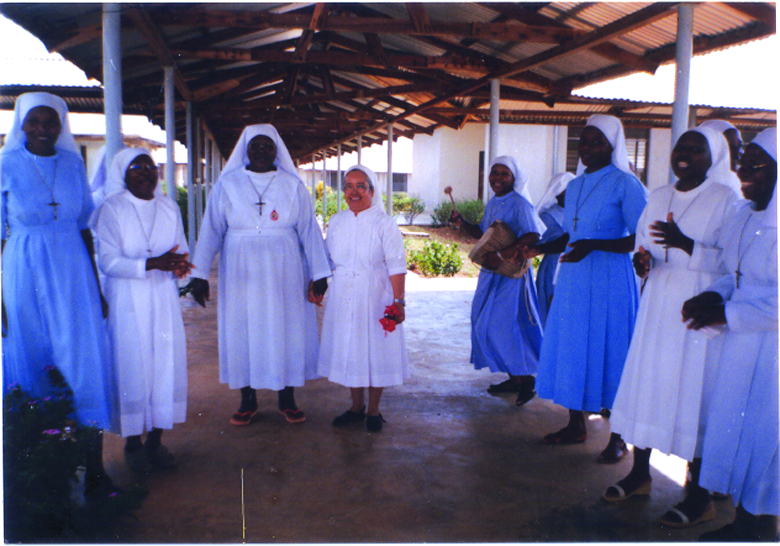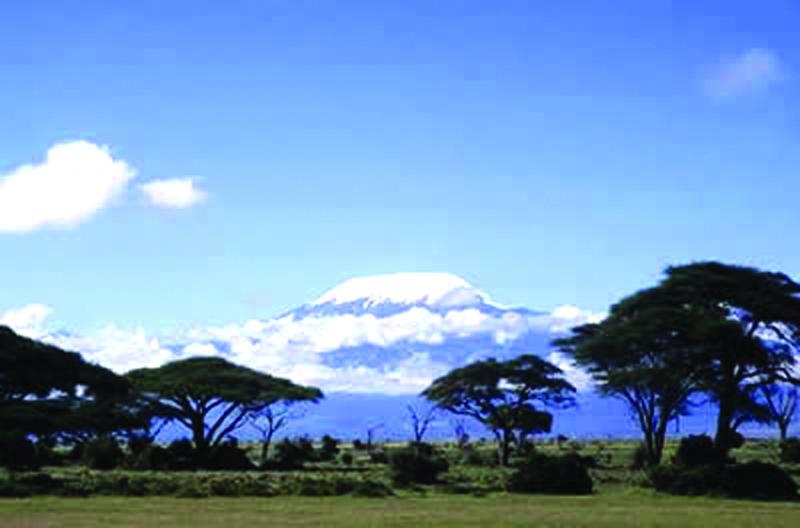Letter From Tanzania

Sr Rosalie with Sisters at
Mtwara Secondary School for Sisters
Dear Father Seán,
Warmest greetings from Africa!
I’m trying to work double time making everything in order here and there for a smooth turnover to whoever will be taking over my work here as I go back to the Philippines for good. My role is really to stabilize the running of the Secondary School for Sisters, Mtwara, in southern Tanzania, and to train local people as much as possible who will continue running it. I can observe that they are gifted but need somebody to help them discover and develop their talents according to the task that will be delegated to them. They feel happy and very honored when entrusted with certain responsibilities, even without additional remuneration, which makes me feel so proud of them.
This school was established in 1994 by Bishop Gabriel Mmole of Mtwara, through the financial support of generous benefactors here and abroad, to help update the educational level of Sisters who haven’t completed secondary school and have been working already for some years in various parishes in Tanzania. It is hoped that by their completing at least high school, or even going for further studies if academically gifted, the quality of their service to the Church will be very much improved.
This school is right in the center of Mtwara town and is equipped with three complete laboratories, something found in very few other secondary schools here, thanks to our very generous donors! Our Sisters are indeed blessed to be studying in this well-equipped school with a quiet and beautiful atmosphere. They have every reason to exert great efforts in performing well in their studies through maximizing their use of all the facilities available.
Studying in the Secondary School for Sisters can be a real struggle, especially for Sisters who are older than the usual secondary school student. But they manage through great diligence and perseverance. They find time to study in-between personal work and assigned tasks in the school and manage to come together each day as a community according to their prayer schedule.
English is the medium of instruction in the school, so I communicate with them always in that language to enable them to have more practice in speaking it. All materials are in English except in the subject of Kiswahili, as they have to pass the National Examination in Form 2 and in Form 4, both given in English. The main reason why some fail is poor English, the greatest block in their studies. I’m sure if examinations were in Kiswahili nobody would ever fail. Whenever I tell the Sisters to do their best in them, they always answer, ‘We’ll try, Sister.’ And they really study so diligently, even late into the night.
Working in Africa teaches you many valuable traits. One good example is the ability of the people to respond quickly to the needs of others, even strangers. I experienced this several times when I just asked an African for directions. She didn’t only tell me but escorted me to the place, even though I could sense that she was in a hurry to go somewhere else. The Africans’ readiness to help you all the way is really something to ponder on.
I also admire very much their ability to listen, especially to a long homily at Mass on Sunday. Their listening is so intense, as if no one could ever disturb them. Of course, there are always negative aspects in a people’s culture, but picking those that are positive in another culture enriches your own. So as I leave behind my African mission, I bring with me all the precious gems I’ve picked along the way working with African people for six solid years, especially the Sisters at Mtwara Secondary School for Sisters. They will forever be part of my life’s history in which I’ve learned to be more patient, loving, understanding and especially attentive and accommodating to the needs of others and more so to love the dignity of work.
I hope that with this mission experience of mine will help inspire others to offer their generous service, especially to the African mission. I wish you and all your staff God’s abundant blessings!
Lovingly yours in Christ,
Sister Rosalie Mujar OSB

Kilimanjaro
The Swahili Language
Swahili, or Kiswahili, is the only language in Africa that can technically be classified as a true ‘lingua franca.’ Unlike most other African languages it’s a non-tribal language. Rather it’s more of an intra-national language of the eastern central and southern Africa. The language spreads from Tanzania, Kenya, Uganda, Rwanda, Burundi, eastern Zaire, northern Zaire, northern Malawi, northern Mozambique, northern Zambia to as far as Somalia. According to Kassim A. Abdullah (1996),although not as widely as in the above mentioned countries, Kiswahili is also used by some people in Congo, Southern Sudan, the Comoros Islands, Northern Malagasy Republic and the Persian Gulf states. It’s currently estimated that well over 100 million people use Swahili for communication. It’s an official language of Tanzania, Kenyaand Uganda. The language enjoys a unique position, particularly at primary and intermediate level education, where it is the official medium of instruction in some countries.
Adapted from http://www.unb.ca/web/civil/dccchair/dmm/swahili.html
The Lord’s Prayer in Swahili (http://incolor.inetnebr.com/stuart/lp_swa.htm)
Baba yetu uliye mbinguni: Jina lako litukuzwe. Ufalme wako ufike. Utakalo lifanyike dunianikama mbinguni. Utupe leo chakula chetu tunachohitaji. Utusamehe makosa yetu, kama nasi tunavyowasamehe waliotukosea. Usitutie katika majaribu, lakini utuokoe na yule Mwovu.